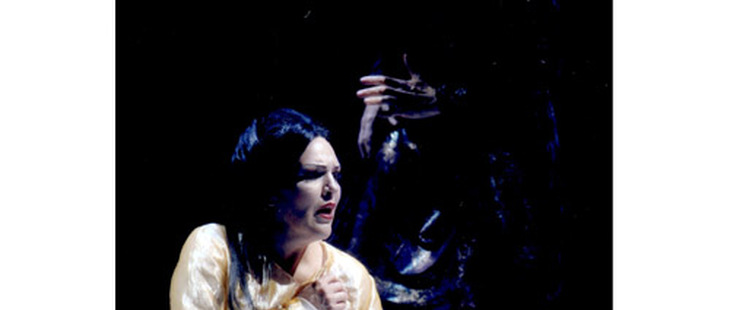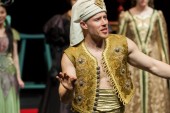
Love in Wagner is a deadly business. Few can elaborate this better than one of the most sought-after sopranos of the lyrical and jugendlich-dramatisch type in the world, Torontonian Adrianne Pieczonka.
Wagner’s young, desperate women in love, fated for the traditional soprano ending, are a mainstay of Pieczonka’s repertoire. Which is not to say that she always plays them as victims. Although Wagner’s tougher women are usually sung by a different Fach, the dramatic sopranos and dramatic mezzos, his ingnues are not uniformly helpless.
“I do find that the roles that I do,” says Pieczonka, “such as Eva in Meistersinger or Elsa in Lohengrin, and even Senta in Der fliegende Hollnder are quite traditional women. But there is always some room for different interpretation. Yes, the knight enchants Elsa, but I’ve never played her as a weak character. By act three she does what she wasn’t supposed to do: asks about his identity. Or let’s take Senta. She falls in love with her ideal — this unknown sailor who comes ashore is the fulfilment of her dream, but she isn’t nave or unintelligent. I play her as somebody who is strong enough to be true to her romantic passion.”
Much depends on the stage director, and European opera houses stage more freely and experimentally than North American ones. In a recent Hollnder in Vienna, the director Christine Mielitz imagined Pieczonka’s Senta as a Marxist activist who yearns to leave the oppressive bourgeois environment of her father-dominated home. The Dutchman is the long awaited escape. Mielitz also changed the way Senta dies. “At the end of that production, she has me taking the gasoline tank and setting myself on fire, instead of throwing myself into the sea. She gives Senta a Wagnerian immolation. Wagner’s heroines like Elsa and Elisabeth just sort of expire; though their big loss they just keel over and die. Mielitz’s take on soprano death was a bit more forceful.”
Unhappy in a pre-programmed relationship with her fianc, Senta does what Tchaikovsky’s Tatiana did: she gets ideas. “When the stranger appears, she goes for it wholeheartedly. But it’s the music here that speaks most eloquently. The drama is in the music, which is not traditionalist or trite in any respect.”
Since her first Wagnerian role of Freia many years ago, the goddess over whom the unpaid giant builders of Valhalla get into a fight in Das Rheingold, Pieczonka’s ties with German Romantic composers have grown manifold. In addition to the expansive operatic and concert repertory that includes Bruckner and Beethoven, she recorded a Wagner/Strauss CD with the Munich Radio Orchestra for the German label Orfeo. In her recital at Koerner Hall this month, she sang Schubert and Wagner’s song cycle, the Wesedonck Lieder, named after the unofficial love of Wagner’s life, Mathilde Wesendonck. At the time of their acquaintance, they were both married to other people.
“The Wesendonck Songs were in a way studies on Tristan. And all the songs are about leaving the burdensome world, leaving the day-to-day and yearning for another plane of existence. They’re about exaltation and a life without mundane things – and so is Tristan. I think Wagner was also writing the first act of Die Walkre at that time and you could argue that the passion between Mathilde Wesendonck and Wagner fuelled the passion between Sigmund and Sieglinde, and Tristan and Isolde. We don’t know if it was a consummated love affair, but it was a real meeting of the minds.”
Was all that talk that the Romantics did about the sublime, wild nature, about mysticism and dying a coded way to talk about sex? “It’s possible that they romanticized death, used it as a trope for something else. There is this entering into a higher plane, a passage onto another level. That way this version of dying can be seen as mystical, beautiful thing.”
Growing up in Burlington, Ontario, perhaps the least Wagnerian of locales in this un-Wagnerian country of ours, Pieczonka’s first serious encounter with the composer didn’t come until she moved to Vienna as a young singer. She had preconceptions: Wagner’s name always came with images of breastplates, horns and singing that’s too loud and too shrill. But as she started singing Wagner, and listening more carefully to his music, a shift began taking place. She describes her Wagner conversion in physical terms: “Little by little, Wagner has gotten under my skin, and into my blood. The more I listen to his music, the more I love it. It’s a drug.”
Today’s worldwide Wagner fandom might suggest that he’s our contemporary. Wagner pilgrims travel the world for the latest Ring Cycle; the last COC Ring had audiences from as far away as Tokyo. The Bayreuth Festival, now run by Wagner’s great-granddaughters, is sold out 10 years in advance. “I don’t think it will ever die out,” she says. “Yes, Wagner had a traditionalist streak in his personal life and some conservative, small-minded views, but musically he was limitless. He also revolutionized the opera staging and sets, and our understanding of what an opera house could be.” Pieczonka is returning to the Bayreuth Festival in the summer of 2012 for a new production of the Hollnder.
There is always some pressure on prominent Wagnerian sopranos to try out Isolde, and Pieczonka has been getting the question for at least a decade now. Recently she was asked if she’d be interested in singing Isolde in Bayreuth in 2015, and her answer was still the same. “My feeling is — no. Besides being a singing marathon with three long acts of mostly Isolde, it’s a low-ish role. Isolde can be sung by a high dramatic mezzo and singers who thrive at the soprano-mezzo threshold, like Waltraud Meier and Jessye Norman. I think the beauty of my voice, the strength of it is in its heights. I want to keep roles like the Empress in Richard Strauss’s Die Frau ohne Schatten, roles that have high Cs and exercise the top.”
Strauss is a composer who remains crucial for Pieczonka. She’s currently singing the title character in Strauss’s Ariadne auf Naxos at the COC, a role she knows well. Ariadne is so much more than a rejoinder to Wagner, Pieczonka insists, and Ariadne more than a send-up of Isolde. She concedes, however, that the characters of Ariadne and Zerbinetta may well be read as a comic take on Wagner’s Tannhuser division of female archetypes into the Wife and the Venus. Strauss is closer to our modern sensibilities. “I don’t doubt that many women move between Ariadne’s yearning for The One and her tragic view of relationships on the one hand, and Zerbinetta’s inability to resist the life’s many beautiful offerings on the other.”
The Strauss opera dearest to her is Der Rosenkavalier. She debuted the role of Marschallin in 1999 and has sung the woman who loses her younger mezzo-soprano lover to an even younger soprano soubrette in at least 10 different productions around the world. The final break-up trio in the 2004 Semyon Bychkov-Robert Carsen production: Marschallin: Adrianne Pieczonka, Octavian: Angelika Kirchschlager, Sophie: Miah Persson.
Her most recent performance of Marschallin was just before last Christmas, in Vienna, in an old Otto Schenk production that the 80-year-old director came back to direct himself. The curtains open onto a scene with Marschallin and Oktavian (nominally a man, but opera audiences were never ones to be easily duped) sharing breakfast in bed after an X-rated overture. It’s the production with the rococo golden bed, explains Pieczonka, and the rich, Habsburg-nostalgia furnishings and costumes that has been preserved in several DVD recordings. “It was a joy to work with one of the old masters,” she says of Schenk. Pieczonka’s dream is to sing one day as Marschallin opposite her wife, the mezzo-soprano Laura Tucker. They will sing as Ariadne and the Composer in Spain in the near future, but this particular Strauss opera doesn’t give the Composer any quality time with Ariadne.
Meanwhile, their joint summer recital is becoming an annual tradition. Last year, Pieczonka and Tucker sang together at Westben and next year will take them to Bayfield Festival; this July they will sing a three-night program in P.E.I. at the Indian River Festival. They will start with a Mediterranean-themed night that includes a French, Spanish and Italian program. Tucker will sing Rossini’s “La regata Veneziana” songs, Pieczonka de Falla’s songs, and it will be “all very Barcarolle.” The following night is reserved for the operatic duets for mezzo and soprano (Butterfly and Norma), and some solo arias (Carmen for Tucker, Aida for Pieczonka). Broadway songs and Gershwin will take up the final night.
Pieczonka will next give her full attention to Verdi. To the Verdi roles that she already sings, like Desdemona, Elisabetta and Amelia, she will add Ballo in maschera, Aida and more. “I think the Verdian soprano is the least represented Fach in the world today. We have a lot of good Strauss and Wagner singers, which I’m happy to be part of, but not as many Verdi voices as 30 years ago.” Her dream Verdi CD would contain arias from Otello, Don Carlo, Un Ballo, Aida, La Forza del destino, and also Trovatore and Ernani. “Glorious, glorious music,” she says.
Pieczonka’s connection with her hometown opera company is also here to stay. She’s confirmed to sing at the COC for the next three years, starting with Puccini’s Tosca in 2012, when she will navigate the treacherous waters of love and Roman politics, address God, stab her torturer and jump off the Castel Sant’Angelo, all the while wearing some lavish Empire cut numbers and show-stopping jewellery. Libiamo to that.
The Canadian Opera Company’s production of Ariadne auf Naxos runs through May 29.















